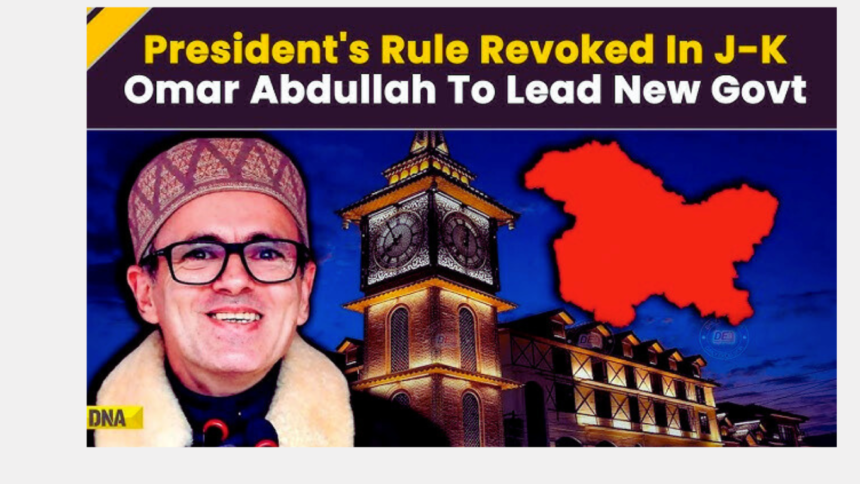
Omar Abdullah
This occurs after Omar Abdullah, the leader of the National Conference, met with Lieutenant Governor Manoj Sinha on Friday to assert his right to form a new government in the wake of the recently held J&K Assembly elections.
A formal order has been issued in Jammu and Kashmir to remove the President’s rule, paving the way for the establishment of a new administration in the Union Territory.
This occurs after Omar Abdullah, the leader of the National Conference, met with Lieutenant Governor Manoj Sinha on Friday to assert his right to form a new government in the wake of the recently held J&K Assembly elections.
“In exercise of the powers conferred by Section 73 of the Jammu and Kashmir Reorganisation Act, 2019 (34 of 2019) read with Articles 239 and 239A of the Constitution of India, the order dated the 31st October 2019 about the union territory of Jammu and Kashmir shall stand revoked immediately before the appointment of the chief minister under Section 54 of the Jammu and Kashmir Reorganisation Act, 2019,” the presidential notification reads.

After the PDP-BJP partnership broke up on June 19, 2018, the area was placed under president’s control.
The government rescinded Article 370 of the Constitution in 2019 and changed the state’s status to Union Territory.
On Thursday, Omar Abdullah was elected to a second term as chief minister after being unanimously selected as the National Conference legislative party’s leader.
During his first tenure, which spanned from 2009 to 2014, when Jammu & Kashmir was a state, the NC-Congress coalition government was in place.
Jammu and Kashmir’s return to statehood will be the primary goal of the incoming administration, according to National Conference President Farooq Abdullah’s remarks on Saturday.
“Bringing Jammu and Kashmir together and putting an end to the hate speech during the election would be our top priorities. Restoring statehood is necessary for the state to run smoothly and for us to carry out our responsibilities.”
Following a ten-year hiatus, Jammu and Kashmir held its inaugural Assembly elections.
In Jammu and Kashmir assembly elections, the National Conference (NC) won 42 seats, while the Congress only managed to capture six, five of which were in Kashmir and one in Jammu.

Pre-election partnership between the two parties had been created. Four independent MLA-elects and one from the Aam Aadmi Party (AAP) back them, which supports their position.
In terms of seats, the Bharatiya Janata Party (BJP) came in second.
Being the first election since Article 370 was invalidated, the three-phased poll that took place on September 18, September 25, and October 1 was historic.

